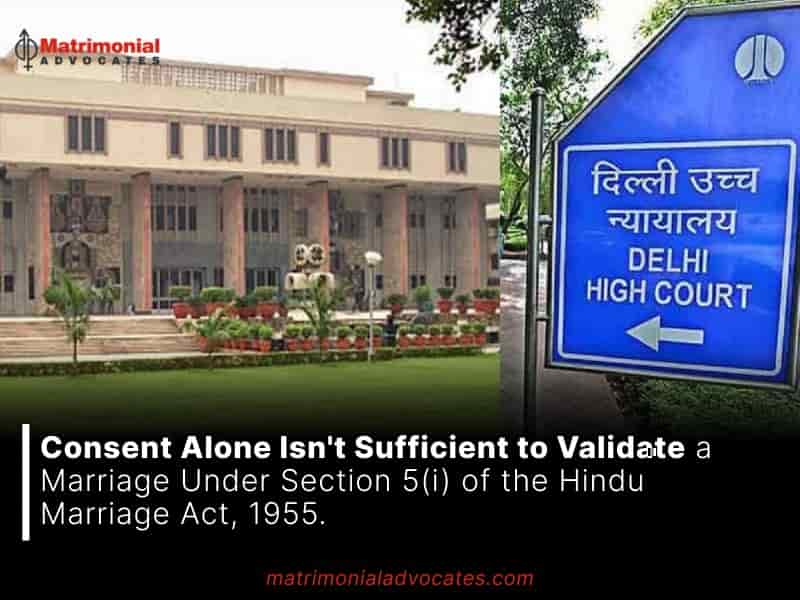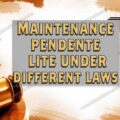
“The very fact that the wife had not only claimed but also accepted pendente lite maintenance during the appeal from the first husband fortifies that the marriage was not finally dissolved.”
Delhi High Court’s Pronouncement on Marriage Validity:
In the instant matter, an appeal brought under Section 19 of the Family Courts Act, 1984, sought to challenge a prior judgment rendered on November 29, 2017, which had declared the nullity of the marriage between the parties under Section 11 of the Hindu Marriage Act, 1955 (HMA). The court determined that consent alone could not validate a marriage when it transgresses the provisions articulated in Section 5(i) of the HMA and when a legal impediment exists to contracting a second marriage. Additionally, the court underscored the wife’s acceptance of interim maintenance during the pendency of an appeal filed by her former spouse, signifying the non-conclusive dissolution of her first marriage. Consequently, the court concurred with the Family Court’s decision to annul the marriage under the HMA and dismissed the appeal.
Case Background:
The parties entered into wedlock on April 28, 2009, adhering to Hindu customs. Notably, the appellant-wife had previously been in a marital union, which was formally dissolved on March 31, 2008. Nevertheless, her former spouse initiated an appeal against the divorce decree. The wife became cognizant of the pending appeal in December 2008; however, the appeal was withdrawn more than four years later, on July 22, 2012.
Owing to marital discord in their second union, the husband initiated legal proceedings under Section 11 of the HMA, seeking the declaration of nullity for their marriage. The husband’s assertion rested on the premise that the wife’s first marriage remained extant owing to the pending appeal, thereby rendering their second marriage legally invalid. The Family Court, in its judgment of November 29, 2017, determined that, in light of the appeal pending against the wife’s initial divorce decree at the time of her second marriage, the latter was in compliance with the provisions of the HMA. Consequently, the court declared the marriage null and void under Section 11 of the HMA.
Subsequently, the wife instituted the present appeal.
Legal Analysis and Decision:
The court acknowledged the wife’s admission, made during her testimony, that she was aware of the pending appeal prior to her second marriage on April 28, 2009. The wife contended that the husband, too, was cognizant of the appeal’s status before their matrimonial union and assured her that the appeal’s pendency would not impede their marital contract.
Considering the constraints delineated in Section 23 of the HMA, which preclude a party from benefiting from their own wrongdoing, the court deliberated on whether the mutual consent of the parties could override a legal impediment. The court expounded that when the provisions of the HMA, specifically Section 5(i), are violated, the marriage is rendered null and void under Section 11. The court emphatically underscored that, in cases involving a legal prohibition against a second marriage, the mutual consent of the parties cannot confer legality upon a marriage that contravenes the conditions specified in Section 5(i) of the HMA.
The court relied on the precedent established in the case of Chandra Mohini Srivastava v. Avinash Prasad Srivastava, AIR 1967 SC 581. This legal authority elucidated that, pursuant to Section 15 of the HMA, a spouse may contract a lawful remarriage only once the period for filing an appeal has lapsed or the appeal itself has been dismissed. In the present case, the parties entered into their matrimonial alliance while the appeal was still pending, a fact acknowledged by both parties. Given that the dissolution of the first marriage was not conclusively established at the time of the second marriage, in consonance with Section 15 of the HMA, the marriage that transpired on April 28, 2009, contravened Section 5(i) of the HMA.
The court also emphasized that the wife had sought and received interim maintenance from her former husband during the pendency of the appeal. This aspect further substantiated the contention that her first marriage had not been definitively dissolved.
In summation, the court concurred with the Family Court’s decision that the marriage was appropriately declared null and void under the HMA and subsequently dismissed the appeal.





